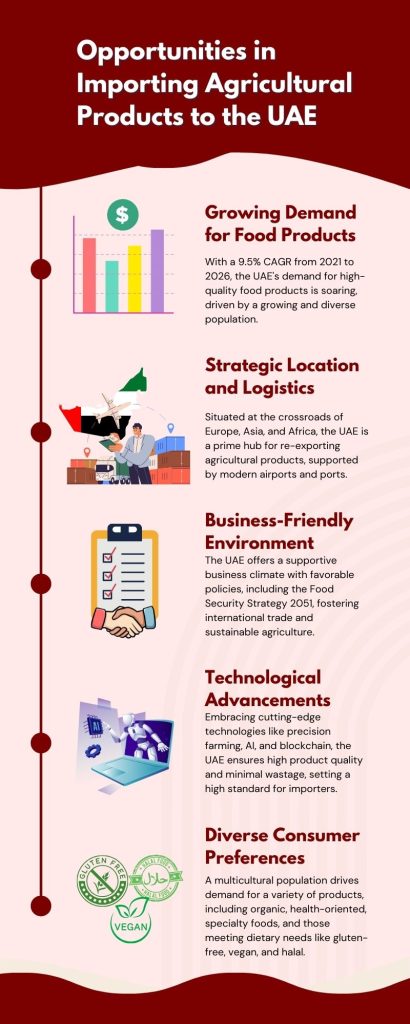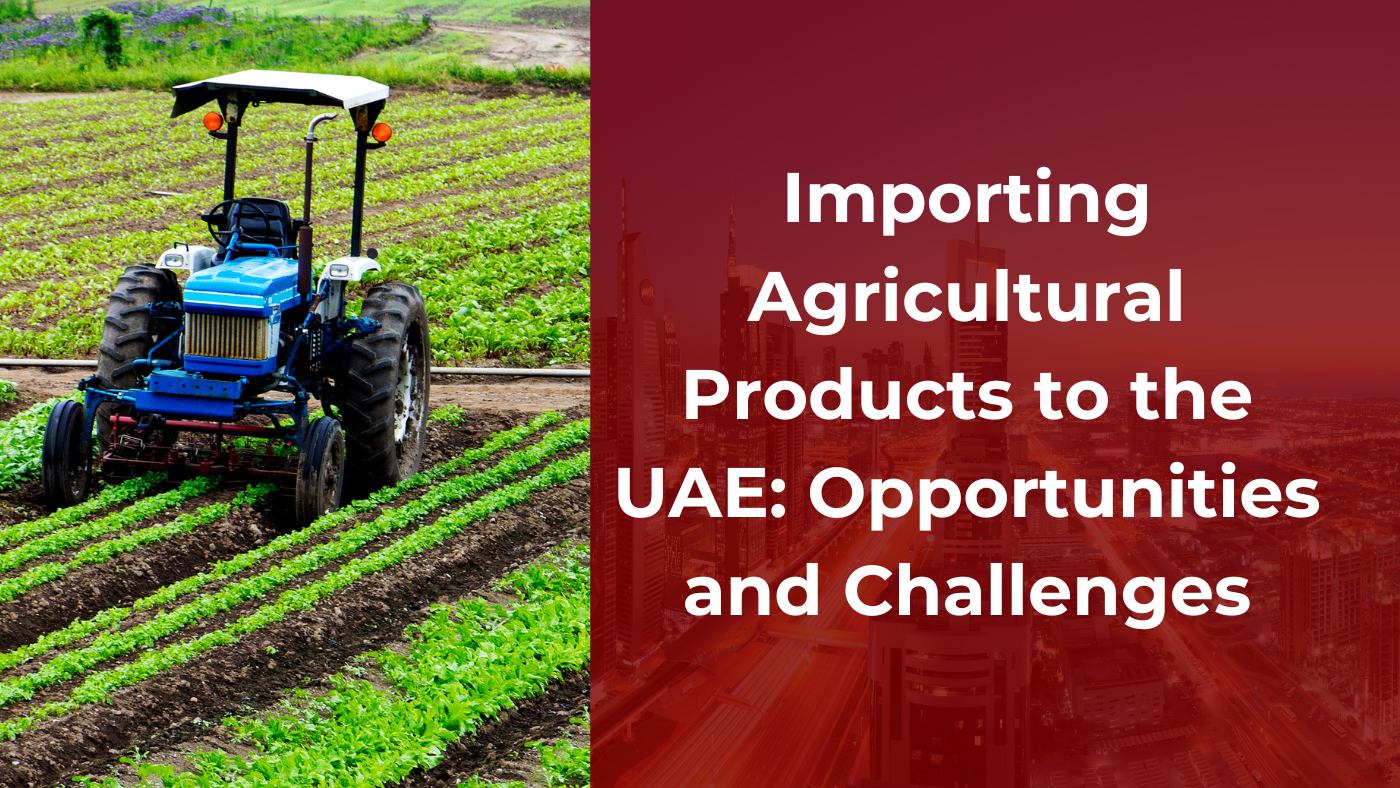Business setup in Dubai is particularly attractive due to the city’s strategic location, advanced infrastructure, and favorable business conditions, all of which reflect the UAE’s fast-moving and emerging economy. Agriculture is a key sector, as the UAE relies heavily on imported foods due to its arid climate and limited farmland. This reliance on imports presents significant business opportunities in the import and export business opportunities in Dubai, UAE. Importing agricultural commodities into the UAE offers numerous opportunities, although it comes with its own set of challenges. This detailed blog addresses these opportunities and difficulties.
Overview of the Agricultural Sector
UAE’s agricultural sector is small, compared to other countries, because of the dry weather conditions and scarce water resources that the country experiences. Despite this, the UAE has invested a lot of money in advanced agricultural technologies and methods to boost their local production through hydroponics and vertical farming. Unfortunately, this is not sufficient to satisfy the increasing food needs since they rely heavily on imports.
Key Agricultural Products Imported in the UAE
UAE imports a large variety of agricultural products from all over the world including fruits, vegetables, grains, meat, and other dairy items as well as drinks. The frequently imported agricultural commodities include:
- Fresh fruits: Apples, bananas, oranges, and berries.
- Vegetables: Tomatoes, cucumbers, potatoes, and onions.
- Grains: Wheat, rice, and corn.
- Meat: Beef, poultry, and lamb.
- Dairy products: Milk, cheese, and yogurt.
- Beverages: Coffee, tea, and fruit juices.
Opportunities in Importing Agricultural Products to the UAE

1. Growing Demand for Food Products
The UAE organic food market is expected to grow at a compound annual growth rate (CAGR) of 9.5% from 2021 to 2026. UAE is experiencing a shift in its demography as its population explodes, thanks to the influx of foreign workers into the country and enhancing tourism activities. The result of this scenario, combined with income increases and changes in food preferences among people residing in this area; all these have increased demand for different food products that are also of high quality. The UAE food and beverage market is projected to reach around USD 23 billion by 2025. A good way for importers to address such needs is through the provision of multifaceted agricultural commodities.
2. Strategic Location and Logistics
At the intersection of Europe, Asia, and Africa is where the United Arab Emirates is found making it a prime location to re-export agricultural goods to other parts of this region. With its advanced logistical facilities like modern airports and ports, it assists in the effective management and distribution of imported products.
3. Business-Friendly Environment
The UAE has an excellent business climate that has adopted policies and regulations favorable for international trade and investments. The government has implemented several initiatives to promote the food and agriculture sector through the adoption of the Food Security Strategy 2051, setting a clear pathway to diversify food sources and sustainable practices in agriculture.
4. Technological Advancements
The UAE is at par with adopting new technologies in farming. Such methods as precision farming, artificial intelligence, and blockchain will increase transparency along the supply chain, surely improving product quality while causing less wastage. Importers can use these technologies to guarantee their products comply with the great standards expected in the UAE market.
5. Diverse Consumer Preferences
The multicultural population in the UAE allows importers to bring a wide variety of products into the country. Organics, health-oriented, and specialty foods are increasingly in demand, as well as those answering specific dietary needs like gluten-free, vegan, and halal.
Challenges in Importing Agricultural Products to the UAE
1. Stringent Regulatory Requirements
The tight regulatory requirements by the UAE regarding food safety and quality are due to it being of great importance. Such include import permits, labeling standards, and health and safety inspections. All these demands are complex and tiresome to tackle by importers.
2. Climate and Storage Conditions
One of the difficulties in storing and delivering green perishable agricultural products to markets is the hot and humid climate in the UAE. Because of this, maintaining a cold chain from origin to destination is very important to product quality and its non-spoilage. To this end, importers are supposed to invest in reliable refrigeration and storage facilities.
3. Competition and Market Saturation
The UAE market is very competitive, with the presence of too many local and international players making it hard to differentiate on quality, branding, and unique selling propositions amidst the clutter. The saturation of markets in certain product categories also presents its own set of problems for new entrants.
4. Price Sensitivity
The people of the UAE are extremely price-sensitive, especially when it comes to staple food items. A balance between the maintenance of high quality and price competition should be ensured for more customer attraction and retention. Fluctuations in the exchange rate and prices of international commodities are elements that may affect the price factor of imported goods.
5. Cultural and Dietary Preferences
In this context, importers must be aware of the culture and eating habits of the heterogeneous population of the UAE. There will likely be a need to get halal certification for some products, and the packaging will have to appeal to locals. The importer should undertake sufficient market research to ensure his product fits into consumer expectations.
Why Choose Cleritbiz?
The UAE’s potential for importing agricultural products is immense, as there is a growing demand for a variety of high-quality food products within its borders. The UAE’s strategic location, cutting-edge logistics infrastructure, and conducive business environment make it an ideal place for importers. For those looking to establish their agricultural import business in the UAE, Cleritbiz is the ideal partner, from business setup to Banking and accounting services in UAE, we got it all covered for you.

